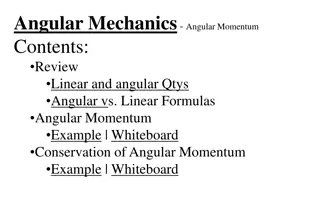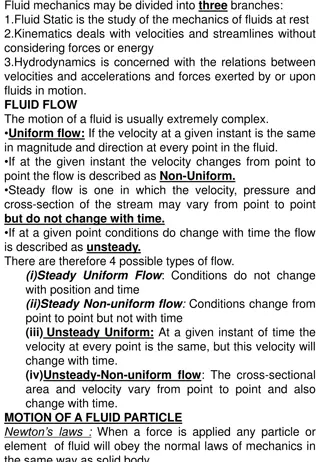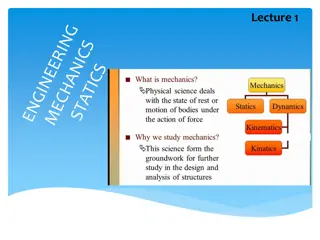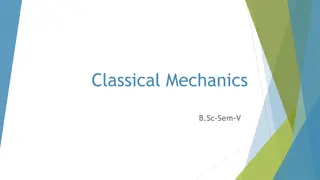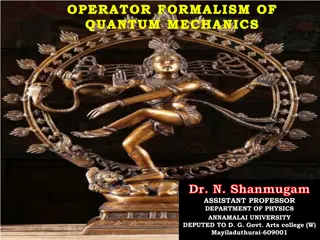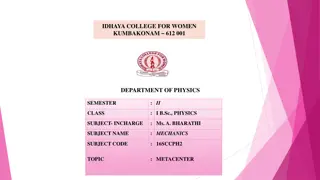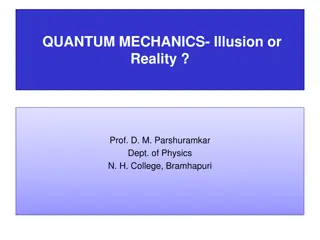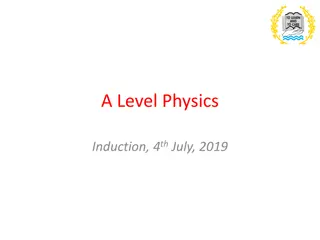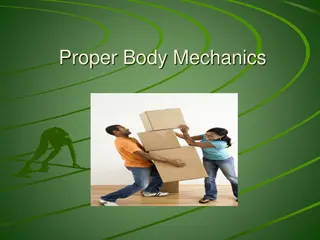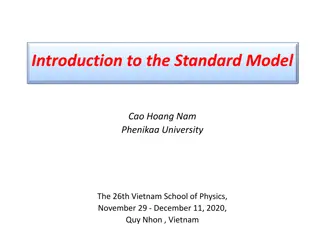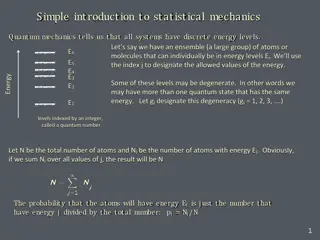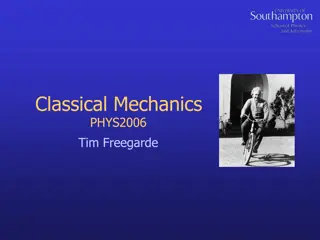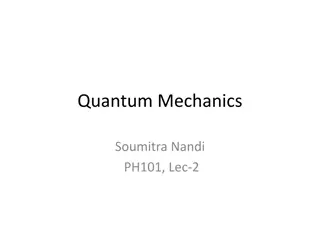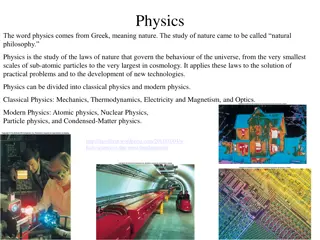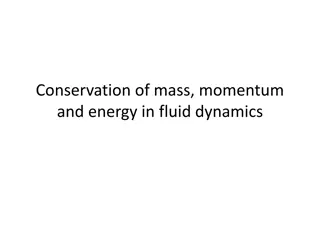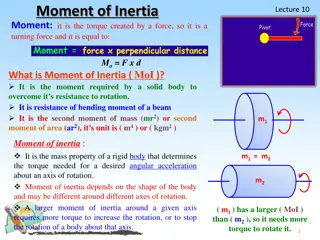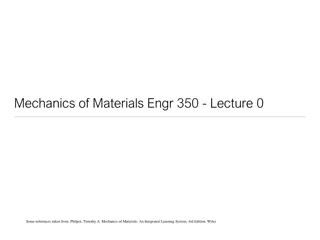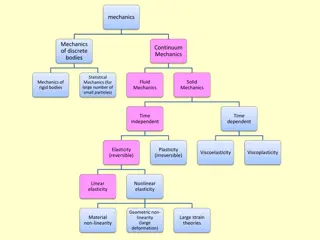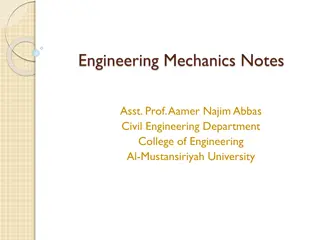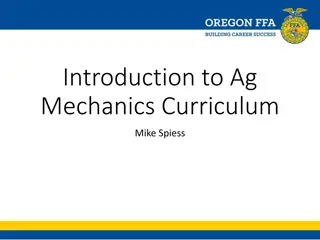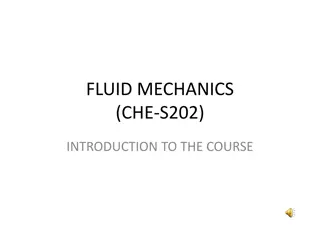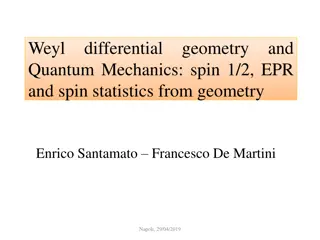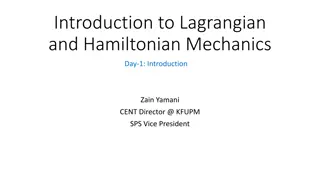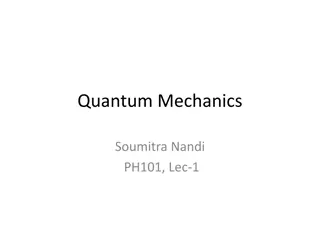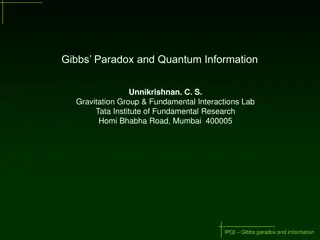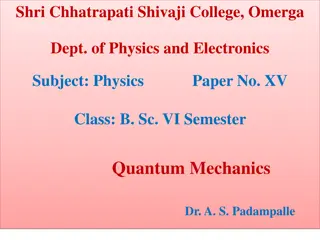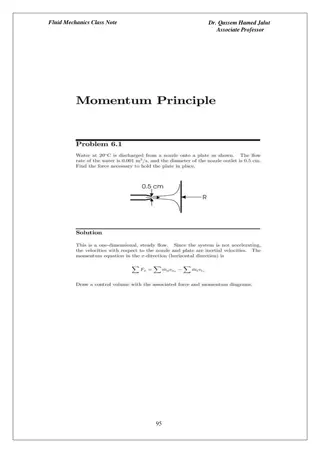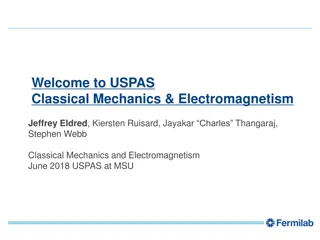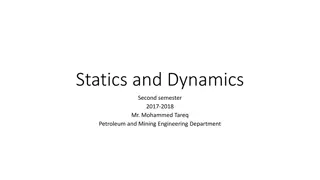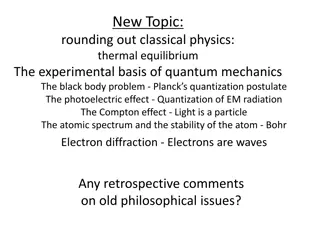Understanding Angular Momentum in Mechanics
Explore the key concepts of angular momentum in mechanics, including the difference between linear and angular quantities, angular momentum calculations, conservation principles, and practical examples illustrated on whiteboards. Delve into formulas, equations, and scenarios to grasp the fundamental
4 views • 27 slides
Overview of Fluid Mechanics: Branches, Flow Types, and Equations
Fluid mechanics is subdivided into three branches: Fluid Static, Kinematics, and Hydrodynamics. The study of fluid flow includes different types such as uniform, non-uniform, steady, and unsteady flow. The motion of fluid particles obeys Newton's laws, and the conservation of mass and energy plays a
1 views • 4 slides
Fundamentals of Mechanics: Introduction to Basic Quantities and Units
Explore the foundational concepts of mechanics in this introductory lecture, covering basic quantities like length, time, mass, and force. Learn about idealizations, units of measurement, SI units, conversion of units, and prefixes used in the context of mechanics.
3 views • 7 slides
Understanding Classical Mechanics: Variational Principle and Applications
Classical Mechanics explores the Variational Principle in the calculus of variations, offering a method to determine maximum values of quantities dependent on functions. This principle, rooted in the wave function, aids in finding parameter values such as expectation values independently of the coor
0 views • 16 slides
Understanding Operator Formalism in Quantum Mechanics
Dive into the world of quantum mechanics with Dr. N. Shanmugam as he explains the role of operators, their significance in quantum mechanics, and how they are used to determine physical quantities through expectation values. Explore concepts such as the Hamiltonian operator, time-independent Schrodi
1 views • 49 slides
Understanding Metacentre in Fluid Mechanics
Metacentre is a crucial concept in fluid mechanics, representing the theoretical point where a displaced body intersects lines passing through the centres of buoyancy and gravity. It is essential for analyzing the stability of floating bodies, especially ships. The metacentric height, the distance b
11 views • 15 slides
Exploring Quantum Mechanics: Illusion or Reality?
Delve into the fascinating realm of quantum mechanics with Prof. D. M. Parshuramkar as he discusses the contrast between classical and quantum mechanics. Discover how classical mechanics fails to predict the behavior of electrons in atoms and molecules, leading to the development of quantum mechanic
1 views • 70 slides
Exploring Neural Quantum States and Symmetries in Quantum Mechanics
This article delves into the intricacies of anti-symmetrized neural quantum states and the application of neural networks in solving for the ground-state wave function of atomic nuclei. It discusses the setup using the Rayleigh-Ritz variational principle, neural quantum states (NQSs), variational pa
0 views • 15 slides
A Level Physics Course Outline and Structure
The A Level Physics course is outlined, detailing the topics covered in Year 12 and A2. The course structure includes three exams at the end of the A2 course and a practical certificate of competence. Topics range from particles and radiation to fields, nuclear physics, and practical skills assessme
0 views • 16 slides
Football Officiating Mechanics and Procedures
The detailed guide covers various aspects of football officiating, from pre-game preparation to on-field mechanics during scrimmage plays. It includes information on line of scrimmage protocols, pre-snap checklists, legal formations, and proper positioning during plays. The content emphasizes key re
0 views • 28 slides
Understanding Orbital Mechanics: Kepler's Laws, Center of Mass, and Equation of Motion
Exploring the fundamental concepts in orbital mechanics including Kepler's Laws, center of mass calculations, and equations of motion for celestial bodies. Topics covered include the laws of planetary motion, center of mass reference frame, and the concept of reduced mass in celestial mechanics.
0 views • 15 slides
Practical Guidance for Care Partners: Maintaining Healthy Body Mechanics and Mobility
This presentation offers practical advice for care partners on how to maintain healthy body mechanics, promote safe transfer and mobility techniques, and use mobility equipment effectively. It emphasizes the importance of being a healthy caregiver, staying strong and fit through appropriate exercise
0 views • 35 slides
Umpire Clinic Takeaways and Field Mechanics Guide
Learn essential tips on what to wear, how to prepare, and key aspects of game time and umpiring mechanics. Explore insights on dealing with coaches and fans, understanding signals, and mastering field mechanics for both one and two-umpire systems. Enhance your skills in calling strikes and balls, ke
0 views • 41 slides
Proper Body Mechanics: Benefits, Causes of Injuries & How to Prevent Them
Body mechanics involve using the body efficiently to reduce strain and promote balance. Proper body mechanics can help conserve energy, reduce stress on muscles and joints, improve respiratory function, and prevent back injuries caused by factors like poor posture, bending, and twisting. Understandi
0 views • 20 slides
Understanding the Standard Model of Physics
Delve into the world of quantum field theory, gauge symmetry, Higgs mechanism, electroweak theory, and more with this detailed overview of the Standard Model. Explore classical mechanics, Noether's theorem, relativistic mechanics, quantum mechanics, and quantum field theory concepts. Discover how th
1 views • 21 slides
Introduction to Statistical Mechanics and Quantum Mechanics
In statistical mechanics, quantum mechanics teaches us that all systems have discrete energy levels. By examining ensembles of atoms or molecules with different energy levels, we can understand probabilities, thermal equilibrium, and average energy using Boltzmann's postulate and the partition funct
0 views • 5 slides
The Logical Structure of Classical and Quantum Mechanics
The paper explores the common logical structure shared between classical and quantum mechanics, emphasizing the non-distributive lattice embedded in a distributive one. It discusses how all physical theories must adhere to this structure, incorporating topology, Heyting algebra, Boolean algebra, and
1 views • 36 slides
Exploring Classical Mechanics in Physics
Delve into classical mechanics with topics ranging from helicopter dynamics and bicycle dynamics to inclined planes and the principles of Newton's laws of motion. Learn about the unique characteristics of instruments like the pianoforte and the foundational principles governing linear and angular mo
0 views • 14 slides
Evolution of Interface Fracture Mechanics: A Historical Perspective
Interface Fracture Mechanics has evolved over the years with significant contributions from researchers like Griffith, Irwin, and Williams. The early years focused on linear elastic fracture mechanics, leading to the development of stress intensity factors and understanding crack propagation. Specif
0 views • 27 slides
Exploring the Fascinating World of Quantum Mechanics Through History
Delve into the intriguing realm of quantum mechanics starting from its basic postulates, probability amplitudes, and measurement principles. Discover how unexplained observations in atomic structures led to the development of quantum mechanics, addressing classical physics problems like Black Body R
0 views • 11 slides
Exploring Physics: From Classical Mechanics to Relativistic Quantum Mechanics
Physics, derived from Greek meaning "nature," encompasses the study of the laws governing the universe at all scales. Classical physics delves into mechanics, thermodynamics, electricity, and optics, while modern physics covers atomic, nuclear, and particle physics. Relativistic Quantum Mechanics co
0 views • 14 slides
Understanding Conservation Principles in Fluid Dynamics and Classical Mechanics
Conservation principles play a significant role in fluid dynamics and classical mechanics. In fluid dynamics, conservation of mass, momentum, and energy are crucial for understanding fluid behavior. Classical mechanics, on the other hand, relies on Newton's laws to describe motion and energy conserv
0 views • 46 slides
Understanding Moment of Inertia and its Importance in Mechanics
Moment of Inertia (MoI) is a crucial concept in mechanics, representing a body's resistance to rotation. It depends on the shape of the object and influences the torque required for rotation. This property plays a significant role in structural mechanics and stress analysis, contributing to understa
0 views • 14 slides
Engineering Mechanics Overview and Problem-Solving Techniques
Explore the fundamental concepts of Engineering Mechanics with references from "Mechanics of Materials: An Integrated Learning System" by Timothy A. Philpot. Learn about approved calculators, problem-solving documentation, free body diagrams (FBDs), and centroids. Enhance your understanding of coord
0 views • 12 slides
Course Overview: Engineering Mechanics-I - Dr. Fahed Alrshoudi
Dive into the fundamentals of statics with Dr. Fahed Alrshoudi's Engineering Mechanics-I course. Covering topics such as force systems, equilibrium, analysis of structures, centroids, moments of inertia, and more, this course aims to equip students with the skills to analyze and solve real-life engi
0 views • 18 slides
Overview of Mechanics and Continuum Mechanics
Mechanics explores the motion of matter and forces influencing it, covering topics such as Elasticity, Plasticity, and Viscoelasticity. Continuum Mechanics delves into the mechanics of bodies, focusing on continuity, homogeneity, and isotropy. Understanding external forces, stresses, and elasticity
0 views • 28 slides
Engineering Mechanics Basics: Introduction, Concepts, and Laws
Dive into the fundamental concepts of engineering mechanics, covering topics such as space, time, mass, and force. Explore Newton's three fundamental laws and the system of units used in mechanics, including SI and English units. Understand the difference between mass and weight and learn about the
0 views • 9 slides
Insights into Agricultural Mechanics Curriculum by Mike Spiess
Delve into the comprehensive Ag Mechanics Curriculum by Mike Spiess covering units, lesson plans, teaching methods, and more. Meet the expert team behind it and explore topics like surveying, electrical skills, and machinery in an engaging and practical approach tailored for ag mechanics education.
0 views • 33 slides
Introduction to Fluid Mechanics Course (CHE-S202): Branches, Nature, Scope, and Important Topics
This course provides an introduction to Fluid Mechanics (CHE-S202) covering the branches, nature, scope, important topics like basic equations, pressure measurement, mass balance, energy balance, and transport processes for momentum, heat, and mass. It explores mathematical and physical principles,
0 views • 6 slides
Understanding Classical Mechanics and Quantum Theory: A Comprehensive Overview
Explore the fundamental principles of classical mechanics and quantum theory through the insightful teachings of Dr. R. R. Mistry. From the mechanics of particles to the wave-particle duality, delve into topics such as conservation laws, Schrodinger's equation, and the origins of quantum theory. Gai
0 views • 22 slides
Quantum Mechanics and Geometric Interpretations in Weyl Space
The discussion explores Weyl quantum mechanics, Bohm's interpretation of quantum potential, and geometric formulations in Euclidean-Weyl space. It delves into the implications of nonlocal quantum potentials and the nature of metric spaces in shaping quantum phenomena. Concluding with alternative vie
0 views • 30 slides
Introduction to Lagrangian and Hamiltonian Mechanics: A Comprehensive Overview
This course provides a detailed introduction to Lagrangian and Hamiltonian Mechanics, covering topics such as the nature of physics, differentiation, calculus of variation, coordinate systems, and getting ready for Lagrangian Mechanics. It explores the relationship between math and physics, utilizin
0 views • 15 slides
Exploring Quantum Mechanics: Unveiling the Mystery of the Subatomic World
Quantum mechanics, the fundamental theory of atomic phenomena, reveals a bizarre yet fascinating world where particles exhibit wave-particle duality and probabilities rule. This theory, beyond direct human perception, explains behaviors in various materials and technologies, paving the way for quant
0 views • 8 slides
Gibbs Paradox and Quantum Information: Understanding Entropy and Resolution
Description of the Gibbs problem of entropy mixing gases, conventional resolution, issues of (dis)continuity, the role of indistinguishability and quantum mechanics in resolution, dissenting views, necessity of quantum mechanics, and the relationship between statistical mechanics and entropy. Key di
0 views • 19 slides
Unveiling the Quantum World: Understanding Blackbody Radiation and Quantum Mechanics
Quantum Mechanics emerged between 1900 and 1930 as a revolutionary theory explaining the behavior of microscopic particles. This article delves into the need for Quantum Physics due to classical mechanics' limitations, focusing on Blackbody Radiation and laws governing it like Wiens Displacement Law
1 views • 30 slides
Fluid Mechanics Class Note by Dr. Qassem Hamed Jalut, Associate Professor
Comprehensive class notes on fluid mechanics by Dr. Qassem Hamed Jalut, an Associate Professor, featuring detailed explanations and problems. The notes cover a wide range of topics essential for understanding fluid mechanics principles and applications.
0 views • 17 slides
Comprehensive Overview of Rock Mechanics Module at TISHK International University
This module at TISHK International University delves into the fundamental and advanced concepts of rock mechanics, focusing on design and stabilization of excavations in rock masses. Students gain knowledge on stress, strain, and elasticity relationships in rock masses, enabling them to characterize
0 views • 36 slides
USPAS Classical Mechanics & Electromagnetism Course Overview
This USPAS course covers Classical Mechanics and Electromagnetism with a focus on topics such as Hamiltonian mechanics, accelerator magnets, relativity, and more. Taught by a team of expert instructors, the course structure includes lectures, homework sessions, exams, and graded assignments. Resourc
0 views • 7 slides
Mechanics: Introduction to Statics and Dynamics in Petroleum and Mining Engineering
Mechanics is a branch of physical sciences concerned with bodies' state of rest or motion under the action of force. It includes statics and dynamics, dealing with equilibrium and accelerated motion. Basic quantities like length, time, mass, and force are crucial in understanding mechanics. Idealiza
0 views • 9 slides
Exploring the Interplay Between Classical Physics and Thermodynamics in Quantum Mechanics
Delve into the foundational principles of classical physics and thermodynamics that paved the way for the development of quantum mechanics. From the black body problem to the quantization postulate by Planck, discover how key phenomena like the photoelectric effect and Compton effect shaped the unde
0 views • 20 slides
